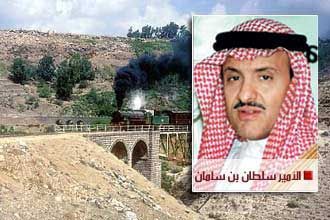
https://www.jafariyanews.com/2k5_news/sep/5prophethome_destruction.htm
https://www.jafariyanews.com/2k5_news/sep/5prophethome_destruction.htm
September 5, 2005
Muslim hush over Saudi destruction of prophet (p) home shocking
TORONTO, Canada: Secretary-General for Saudi Supreme Association for Tourism prince Sultan bin Salman bin Abdulaziz has condemned Saudi government plan to demolish Islamic signs and buildings in the holy cities of Medina and Makkah.
Talking to London-based Asharq Al-Awsat Arabic language newspaper on Sunday September 4, Abdulaziz stressed that powers that be have no legal authority to touch or demolish historical sites.
The daily writes that operations of demolition of important signs in the holy city of Medinah are neither the first nor would be the last, as earlier seven mosques including Bani Qoreyza Mosque were razed to ground despite their religious, historic and cultural importance as well as their status in the period of Prophet (peace be upon him and his pure progeny).
Four years back, controversy was caused regarding demolition of Mosque of Al-Imam Ali Al-Aridhi, grandson of Al-mam Ali bin Abi Taleb (peace be upon him), in the holy city of Medinah because of its establishment on his grave.
Asharq Al-Awsat went on saying that different organizations for protection of archeological sites with agency of signs and museums on top of the list stood to stop destruction of Islamic, historical and cultural signs in the holy city of Medina, but they failed.
A number of care-takers for the signs, according to the newspaper, including Dr Abdullah Nasif, member Shura Council Dr Ayedh Ar-Radadi and Dr Anvar Ashqy, criticized steps to demolish these signs and called to protect the remaining Islamic sites and signs.
According to reports some of Holy Makkah and Medina's most historic sites including a home of the Holy Prophet Muhammad (peace be upon him and his pure progeny), are under threat from Saudi real estate developers.
https://www.jafariyanews.com/2k5_news/sep/5prophethome_destruction.htm
https://dash.harvard.edu/server/api/core/bitstreams/3ad95166-6289-4f57-bbc4-5df9c31c4ef2/content
Proclamations by the Saudi Government
While the ulama’s proclamations on why destruction is necessary came in the form of fatwas, the Saudi government produced its own notifications, but on the subject of preservation. For example, in 2000 the Saudi government initiated the Saudi Commission for Tourism and National Heritage (SCTH, 2017), formerly known as the Saudi Commission of Tourism and Antiquities (SCTA), “to stimulate and develop not only tourism but also the national heritage sectors in the Kingdom” (“SCTH Initiatives,” 2017). In 2013, the Islamic History Sites Care Program was inaugurated by the SCTH to care for Islamic historical sites that are “associated with the Prophet’s Sira (Prophet’s life and events) and the era of early Muslim Caliphs” (“SCTA President,” 2017). The program “participates in the supervision of their restoration, rehabilitation, and maintenance projects, and develops the necessary action plans to conserve these sites” (SCTA,” 2015.). According to the official SCTH website and the President of SCTH, Prince Sultan bin Salman bin Abdul Aziz, the preservation works “are totally carried out in compliance with the sharia laws and rules and respecting Islamic faith and principles,” because the country, since its establishment by King Abdul Aziz, is based on “the sharia laws and the Prophet Muhammad’s Sunnah (the Prophetic tradition), and pure faith of Islam” (SCTA President”, 2017). The program supervisor, Saad Al Rashi, provided a comprehensive report on “documenting Islamic history sites, rehabilitating water resources and wells associated with the Prophet Muhammad’s Sira, in addition to rehabilitating Prophet’s migration route” (“SCTA President”, 2017). The Saudi state’s claim of efforts to preserve the sites included “sites in Makkah and Madina and protecting them from misuse and encroachment.” The President of SCTH Prince Sultan stated:
I would like here also to refer to the great efforts made by government in preservation of antiquities during current expansion in the Holy Mosque. During the expansion process surrounding the Holy Mosque, which aims to facilitate pilgrims’ performance of hajj rites in particular in Makkah as well as facilitating the visitation to the Holy Mosques in general. The government is also keen to document the historic landmarks and ensure they are not being removed or destroyed. (“SCTA President,” 2017)
Similar assertions have been documented by the local news. For example, Arab News published what the President of SCTH, Prince Sultan bin Salman, had stated
“regarding the expansion works in the two holy cities of Makkah and Madinah and their impact on archaeological and historical sites, and how the government is keen to protect such sites as they are part of Islamic history” (“Thousands of Artifacts,” 2014).
